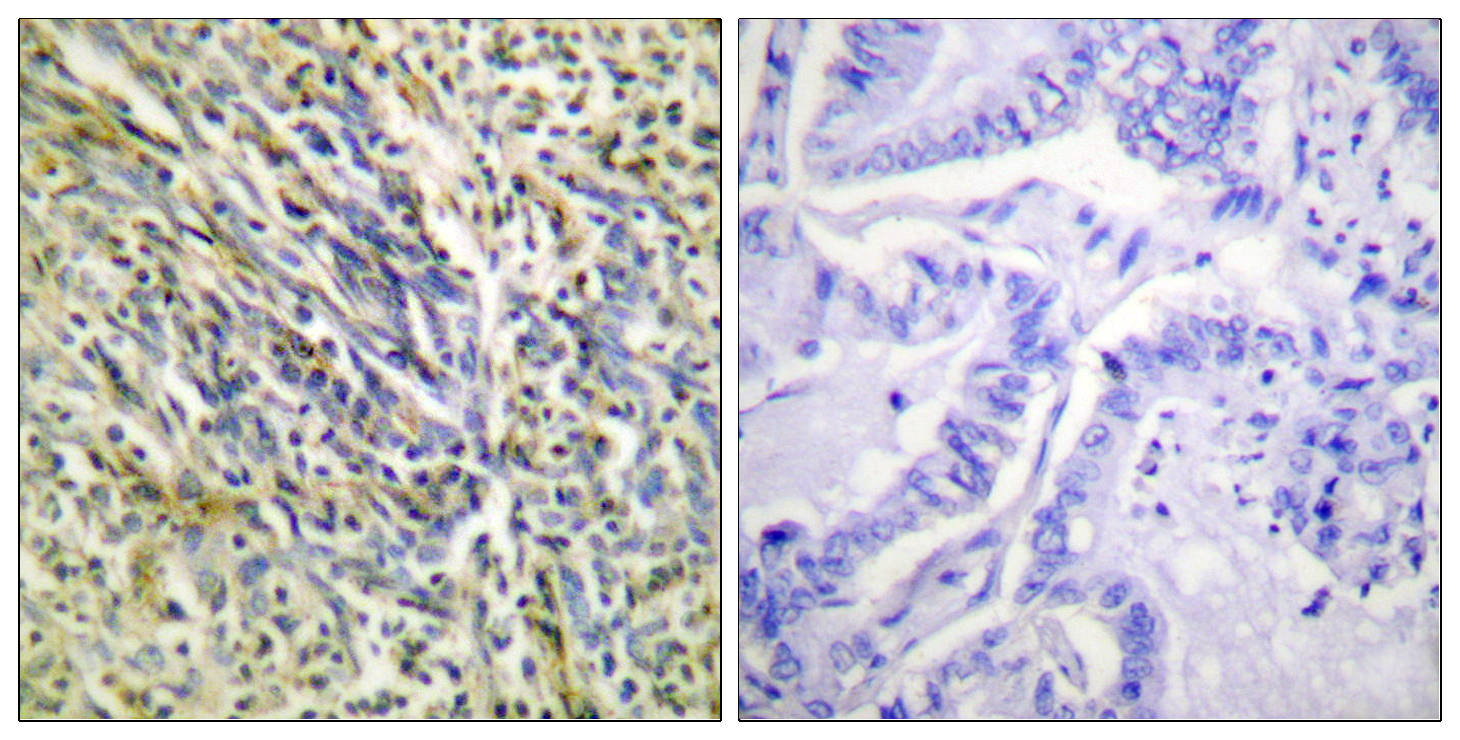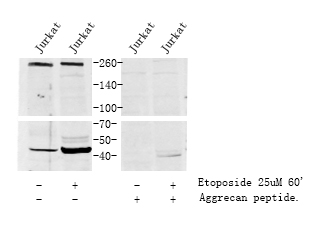Cleaved-Aggrecan (D369) Polyclonal Antibody
- Catalog No.:YC0042
- Applications:WB;IHC;IF;ELISA
- Reactivity:Human;Rat
- Target:
- Aggrecan
- Gene Name:
- ACAN
- Protein Name:
- Aggrecan core protein
- Human Gene Id:
- 176
- Human Swiss Prot No:
- P16112
- Mouse Swiss Prot No:
- Q61282
- Rat Gene Id:
- 58968
- Rat Swiss Prot No:
- P07897
- Immunogen:
- The antiserum was produced against synthesized peptide derived from human Aggrecan. AA range:320-369
- Specificity:
- Cleaved-Aggrecan (D369) Polyclonal Antibody detects endogenous levels of fragment of activated Aggrecan protein resulting from cleavage adjacent to D369.
- Formulation:
- Liquid in PBS containing 50% glycerol, 0.5% BSA and 0.02% sodium azide.
- Source:
- Polyclonal, Rabbit,IgG
- Dilution:
- WB 1:500 - 1:2000. IHC 1:100 - 1:300. ELISA: 1:20000.. IF 1:50-200
- Purification:
- The antibody was affinity-purified from rabbit antiserum by affinity-chromatography using epitope-specific immunogen.
- Concentration:
- 1 mg/ml
- Storage Stability:
- -15°C to -25°C/1 year(Do not lower than -25°C)
- Other Name:
- ACAN;AGC1;CSPG1;MSK16;Aggrecan core protein;Cartilage-specific proteoglycan core protein;CSPCP;Chondroitin sulfate proteoglycan core protein 1;Chondroitin sulfate proteoglycan 1
- Observed Band(KD):
- 44kD
- Background:
- This gene is a member of the aggrecan/versican proteoglycan family. The encoded protein is an integral part of the extracellular matrix in cartilagenous tissue and it withstands compression in cartilage. Mutations in this gene may be involved in skeletal dysplasia and spinal degeneration. Multiple alternatively spliced transcript variants that encode different protein isoforms have been observed in this gene. [provided by RefSeq, Jul 2008],
- Function:
- alternative products:Additional isoforms seem to exist,developmental stage:Expression was detected in chondrocytes throughout the developing skeleton.,disease:Defects in ACAN are the cause of spondyloepiphyseal dysplasia type Kimberley (SEDK) [MIM:608361]. Spondyloepiphyseal dysplasias are a heterogeneous group of congenital chondrodysplasias that specifically affect epiphyses and vertebrae. The autosomal dominant SEDK is associated with premature degenerative arthropathy.,domain:Two globular domains, G1 and G2, comprise the N-terminus of the proteoglycan, while another globular region, G3, makes up the C-terminus. G1 contains Link domains and thus consists of three disulfide-bonded loop structures designated as the A, B, B' motifs. G2 is similar to G1. The keratan sulfate (KS) and the chondroitin sulfate (CS) attachment domains lie between G2 and G3.,function:This proteoglycan is a majo
- Subcellular Location:
- Secreted, extracellular space, extracellular matrix .
- Expression:
- Restricted to cartilages.
- June 19-2018
- WESTERN IMMUNOBLOTTING PROTOCOL
- June 19-2018
- IMMUNOHISTOCHEMISTRY-PARAFFIN PROTOCOL
- June 19-2018
- IMMUNOFLUORESCENCE PROTOCOL
- September 08-2020
- FLOW-CYTOMEYRT-PROTOCOL
- May 20-2022
- Cell-Based ELISA│解您多样本WB检测之困扰
- July 13-2018
- CELL-BASED-ELISA-PROTOCOL-FOR-ACETYL-PROTEIN
- July 13-2018
- CELL-BASED-ELISA-PROTOCOL-FOR-PHOSPHO-PROTEIN
- July 13-2018
- Antibody-FAQs
- Products Images

- Immunohistochemistry analysis of paraffin-embedded human lung carcinoma tissue, using Aggrecan (Cleaved-Asp369) Antibody. The picture on the right is blocked with the synthesized peptide.

- Western blot analysis of lysates from various cells, using primary antibody dilution at 1:1000.



